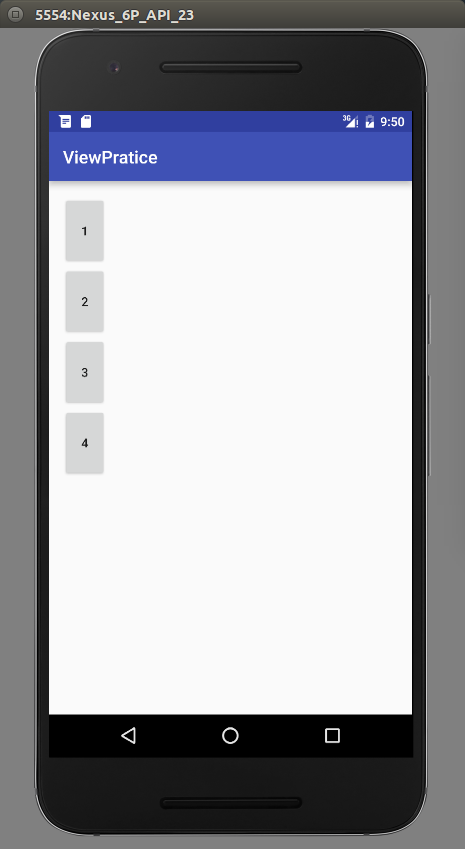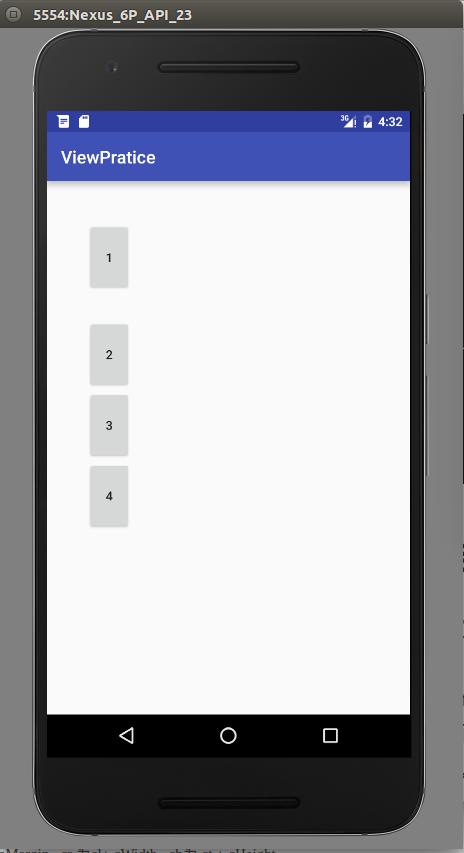简单的例子了解自定义ViewGroup(一)
在Android中,控件可以分为ViewGroup控件与View控件。自定义View控件,我之前的文章已经说过。这次我们主要说一下自定义ViewGroup控件。ViewGroup是作为父控件可以包含多个View控件,并管理其中包含的View控件。
一般自定义ViewGroup的流程如下:
onMeasure()onLayout()
我们一般不需要像自定义View一样重写onDraw(),这里需要多写一个onLayout来摆放子View的位置。除了onLayout方法之外,我们还需要确定LayoutParams,这个是子View告诉父布局的一些参数信息,比如MarginLayoutParams,则表明该ViewGroup支持margin,当然这个也可以没有。
下面我们通过一个例子来说明简单的自定义ViewGroup
一个简单的例子
这个例子,我们将写一个ViewGroup,该ViewGroup中4个button排成一列。这个例子主要说明onMeasure和onLayout的写法。
首先我们新建一个MyViewGroup继承ViewGroup,然后重写onMeasure方法。
@Override
protected void onMeasure(int widthMeasureSpec, int heightMeasureSpec) {
super.onMeasure(widthMeasureSpec,heightMeasureSpec);
measureChildren(widthMeasureSpec,heightMeasureSpec);
}
这个重写非常的简单,调用父类的测量方法,然后测量所有的子控件的,只要子控件不是wrap_content都会测量精准。这里为了简单,没有去考虑wrap_content的情况,后面我们完善的时候会说道。
然后重写onLayout()方法
@Override
protected void onLayout(boolean changed, int l, int t, int r, int b) {
int height = 0;
int count = getChildCount();
View child;
Log.e("ri", count + "");
for(int i = 0 ;i < count;i++) {
child = getChildAt(i);
child.layout(0, height, child.getMeasuredWidth(),height + child.getMeasuredHeight());
height += child.getMeasuredHeight();
}
}
这里的代码很好理解,因为我们要实现4个button一列显示,然后每个子View的宽度是一样的,并且每个子View的left和right是一样的。所以每个子View只有top和bottom不一样。我们首先定义个高度height初始为0,然后得到所有子View的个数,依次设置每个子View的top和bottom。top就是定义的height,bottom则为height加上子View的高度。设置完后height累加。
xml中布局如下:
<com.example.byhieg.viewpratice.MyViewGroup android:layout_height="match_parent"
android:layout_width="match_parent">
<Button
android:text="1"
android:layout_width="50dp"
android:layout_height="80dp" />
<Button
android:text="2"
android:layout_width="50dp"
android:layout_height="80dp" />
<Button
android:text="3"
android:layout_width="50dp"
android:layout_height="80dp" />
<Button
android:text="4"
android:layout_width="50dp"
android:layout_height="80dp" />
</com.example.byhieg.viewpratice.MyViewGroup>
效果如下:

下面,我们继续完善这个控件,让他适应wrap_content。这里,我们主要重写onMeasure()
@Override
protected void onMeasure(int widthMeasureSpec, int heightMeasureSpec) {
super.onMeasure(widthMeasureSpec,heightMeasureSpec);
int widthMode = MeasureSpec.getMode(widthMeasureSpec);
int widthSize = MeasureSpec.getSize(widthMeasureSpec);
int heightMode = MeasureSpec.getMode(heightMeasureSpec);
int heightSize = MeasureSpec.getSize(heightMeasureSpec);
measureChildren(widthMeasureSpec,heightMeasureSpec);
//开始处理wrap_content,如果一个子元素都没有,就设置为0
if (getChildCount() == 0) {
setMeasuredDimension(0,0);
} else if (widthMode == MeasureSpec.AT_MOST && heightMode == MeasureSpec.AT_MOST) {
//ViewGroup,宽,高都是wrap_content,根据我们的需求,宽度是子控件的宽度,高度则是所有子控件的总和
View childOne = getChildAt(0);
int childWidth = childOne.getMeasuredWidth();
int childHeight = childOne.getMeasuredHeight();
setMeasuredDimension(childWidth, childHeight * getChildCount());
} else if (widthMode == MeasureSpec.AT_MOST) {
//ViewGroup的宽度为wrap_content,则高度不需要管,宽度还是自控件的宽度
View childOne = getChildAt(0);
int childWidth = childOne.getMeasuredWidth();
setMeasuredDimension(childWidth,heightSize);
} else if (heightMode == MeasureSpec.AT_MOST) {
//ViewGroup的高度为wrap_content,则宽度不需要管,高度为子View的高度和
View childOne = getChildAt(0);
int childHeight = childOne.getMeasuredHeight();
setMeasuredDimension(widthSize, childHeight * getChildCount());
}
}
主要通过注释,就可以很明白wrap_content的情况下,如何计算viewGroup的高度和宽度。在viewGroup的onMeasure,我们是不需要在这里面考虑每一个View的宽高,这个通过measureChildren来通知每一个子View自己测量的。我们只需要考虑viewGroup的宽高在自适应的情况下,该是多大。
LayoutParams
在上面这个简单的ViewGroup中,我们是没有设置margin的,也就是说,即使我们在子View中设置了margin也是没有效的。我们需要修改我们的自定义ViewGroup来适应margin的情况。这里我们为了简化情况,只设定第一个button有一个android:layout_margin="30dp"的属性。
这里,我们修改onMeasure方法,让viewGroup的宽度变为原来的宽度加上margin的宽度,高度也是原来的高度加上margin的高度。代码如下:
@Override
protected void onMeasure(int widthMeasureSpec, int heightMeasureSpec) {
super.onMeasure(widthMeasureSpec,heightMeasureSpec);
MarginLayoutParams params = null;
int widthMode = MeasureSpec.getMode(widthMeasureSpec);
int widthSize = MeasureSpec.getSize(widthMeasureSpec);
int heightMode = MeasureSpec.getMode(heightMeasureSpec);
int heightSize = MeasureSpec.getSize(heightMeasureSpec);
measureChildren(widthMeasureSpec,heightMeasureSpec);
//开始处理wrap_content,如果一个子元素都没有,就设置为0
if (getChildCount() == 0) {
setMeasuredDimension(0,0);
} else if (widthMode == MeasureSpec.AT_MOST && heightMode == MeasureSpec.AT_MOST) {
//ViewGroup,宽,高都是wrap_content,根据我们的需求,宽度是子控件的宽度,高度则是所有子控件的总和
View childOne = getChildAt(0);
params = (MarginLayoutParams) childOne.getLayoutParams();
int childWidth = childOne.getMeasuredWidth();
int childHeight = childOne.getMeasuredHeight();
setMeasuredDimension(childWidth + params.leftMargin + params.rightMargin,
childHeight * getChildCount() + params.topMargin + params.bottomMargin);
} else if (widthMode == MeasureSpec.AT_MOST) {
//ViewGroup的宽度为wrap_content,则高度不需要管,宽度还是自控件的宽度
View childOne = getChildAt(0);
params = (MarginLayoutParams) childOne.getLayoutParams();
int childWidth = childOne.getMeasuredWidth();
setMeasuredDimension(childWidth + params.leftMargin + params.rightMargin,heightSize);
} else if (heightMode == MeasureSpec.AT_MOST) {
//ViewGroup的高度为wrap_content,则宽度不需要管,高度为子View的高度和
View childOne = getChildAt(0);
params = (MarginLayoutParams) childOne.getLayoutParams();
int childHeight = childOne.getMeasuredHeight();
setMeasuredDimension(widthSize, childHeight * getChildCount() + params.topMargin + params.bottomMargin);
}
}
这里,注意这个语句params = (MarginLayoutParams) childOne.getLayoutParams(); 如果不重写layoutParams相关的代码,这样直接转换会出现问题。所以,我们需要重写如下代码:让他返回MarginLayoutParams类型的对象
@Override
public LayoutParams generateLayoutParams(AttributeSet attrs) {
return new MarginLayoutParams(getContext(),attrs);
}
@Override
protected LayoutParams generateDefaultLayoutParams() {
return new MarginLayoutParams(LayoutParams.MATCH_PARENT,
LayoutParams.MATCH_PARENT);
}
@Override
protected LayoutParams generateLayoutParams(LayoutParams p) {
return new MarginLayoutParams(p);
}
同样,我们已经测量得到了viewGroup的宽和高,接下来,需要对添加了margin的view,重新摆放。主要的摆放规则,左边的坐标为Leftmargin,第一个view的上面的坐标为topMargin,同时,第二个view的上面的坐标要加上bottomMargin。这个只是一个简单的例子来说明放入margin之后要怎么考虑,一般不会这么具体到只计算第一个view的Margin。代码看看就好
@Override
protected void onLayout(boolean changed, int l, int t, int r, int b) {
int height = 0;
int count = getChildCount();
View child;
Log.e("ri", count + "");
child = getChildAt(0);
MarginLayoutParams params = (MarginLayoutParams) child.getLayoutParams();
int c1 = params.leftMargin;
int c2 = params.topMargin;
int c3 = c1 + child.getMeasuredWidth();
int c4 = c2 + child.getMeasuredHeight();
child.layout(c1,c2, c3,c4);
height = c4 + params.bottomMargin;
for(int i = 1 ;i < count;i++) {
child = getChildAt(i);
child.layout(c1, height, c3, height + child.getMeasuredHeight());
height += child.getMeasuredHeight();
}
}

总结
这是自定义ViewGroup的第一篇文章,自定义ViewGroup是比自定义View知识点更多,而且应用也更广泛。这篇只是简单的介绍了自定义ViewGroup中需要复写的方法,但是一般的viewGroup不会是这样的。上面的东西,用一个LinearLayout布局实现,然后include该布局更方便。一般viewGroup都需要我们来实现view事件的分发以及滑动的处理,接下来的文章,讲介绍滑动的多种方式。
简单的例子了解自定义ViewGroup(一)的更多相关文章
- [安卓] 18、一个简单的例子做自定义动画按钮和自定义Actionbar
在做安卓UI的时候有时候需自定义具有动画效果的按钮或需要自定义一下actionbar~ 本节用一个简单的demo讲如何自定义具有动画效果的按钮,以及个性化的actionbar 下面是效果: 其中: △ ...
- android 自定义ViewGroup和对view进行切图动画实现滑动菜单SlidingMenu
示意图就不展示了,和上一节的一样,滑动菜单SlidingMenu效果如何大家都比较熟悉,在这里我简单说明一下用自定义ViewGroup来实现. 实现方法:我们自定义一个ViewGroup实现左右滑动, ...
- android 自定义ViewGroup和对view进行切图动画实现滑动菜单SlidingMenu[转]
http://blog.csdn.net/jj120522/article/details/8095852 示意图就不展示了,和上一节的一样,滑动菜单SlidingMenu效果如何大家都比较熟悉,在这 ...
- Jsp2.0自定义标签(第一天)——一个简单的例子
今天是学习自定义标签的第一天 Jsp2.0以来,自定义标签的实现比传统标签的实现容易了很多,一般只要extends类SimpleSupport重写doTag()方法即可. 先看最简单的例子,输出一个H ...
- 简单的自定义ViewGroup
自定义ViewGroup需要重写onMeasure, onLayout等方法.下面是一个实例,4个View分别显示在四个角. public class MyGroup extends ViewGrou ...
- android 手把手教您自定义ViewGroup(一)
1.概述 在写代码之前,我必须得问几个问题: 1.ViewGroup的职责是啥? ViewGroup相当于一个放置View的容器,并且我们在写布局xml的时候,会告诉容器(凡是以layout为开头的属 ...
- Android之自定义ViewGroup
概述 在写代码之前,我必须得问几个问题: 1.ViewGroup的职责是啥? ViewGroup相当于一个放置View的容器,并且我们在写布局xml的时候,会告诉容器(凡是以layout为开头的属性, ...
- Android ViewDragHelper完全解析 自定义ViewGroup神器
Android ViewDragHelper完全解析 自定义ViewGroup神器 转载请标明出处: http://blog.csdn.net/lmj623565791/article/detai ...
- Kotlin 第一弹:自定义 ViewGroup 实现流式标签控件
古人学问无遗力, 少壮工夫老始成.纸上得来终觉浅, 绝知此事要躬行. – 陆游 <冬夜读书示子聿> 上周 Google I/O 大会的召开,宣布了 Kotlin 语言正式成为了官方开发语言 ...
随机推荐
- SQLSERVER将一个文件组的数据移动到另一个文件组
SQLSERVER将一个文件组的数据移动到另一个文件组 有经验的大侠可以直接忽视这篇文章~ 这个问题有经验的人都知道怎麽做,因为我们公司的数据量不大没有这个需求,也不知道怎麽做实验 今天求助了QQ群里 ...
- 在.NET Core 里使用 BouncyCastle 的DES加密算法
.NET Core上面的DES等加密算法要等到1.2 才支持,我们可是急需这个算法的支持,文章<使用 JavaScriptService 在.NET Core 里实现DES加密算法>需要用 ...
- 移动端IOS点击事件失效解决方案
解决方案 解决办法有 4 种可供选择: 1 将 click 事件直接绑定到目标元素(即 .target)上 2 将目标元素换成 <a> 或者 button 等可点击的元素 3 将 clic ...
- 前端学HTTP之日志记录
前面的话 几乎所有的服务器和代理都会记录下它们所处理的HTTP事务摘要.这么做出于一系列的原因:跟踪使用情况.安全性.计费.错误检测等等.本文将谥介绍日志记录 记录内容 大多数情况下,日志的记录出于两 ...
- jQuery学习之路(3)- 事件
▓▓▓▓▓▓ 大致介绍 jQuery增加了并扩展了基本的事件处理机制,不但提供了更加优雅的事件处理语法,而且极大地增强了事件处理能力 ▓▓▓▓▓▓ jQuery中的事件 ▓▓▓▓▓▓ 加载DOM 在j ...
- python与c互相调用
虽然python开发效率很高,但作为脚本语言,其性能不高,所以为了兼顾开发效率和性能,通常把性能要求高的模块用c或c++来实现或者在c或c++中运行python脚本来处理逻辑,前者通常是python中 ...
- Smarty的基本使用与总结
含义: Smarty是PHP的一个引擎模板,可以更好的进行逻辑与显示的分离,即我们常说的MVC,这个引擎的作用就是将C分离出来. 环境需求:PHP5.2或者更高版本 我使用的环境是:PHP5.3,wi ...
- mac好用的markdown编辑器
在刚开始接触markdown的时候,就被吸引了.此后一直在找贴心的好用的markdown编辑器.印象笔记和马克飞象配合着用也是挺好的,唯一的缺点就是比较封闭,发个笔记的链接给同学,还得注册才能看,导致 ...
- 项目自动化建构工具gradle 入门1——输出helloWorld
先来一个简单的例子,4个步骤: 1.进入D:\work\gradle\java 目录 ,您电脑没这目录? 那辛苦自己一级一级建立起来吧 新建文件build.gradle,文件内容是: apply p ...
- OpenWrt中开启usb存储和samba服务
在从官网安装的WNDR3800 15.05.1版本OpenWrt中, 不带usb存储支持以及samba, 需要另外安装 1. 启用usb支持 USB Basic Support https://wik ...
